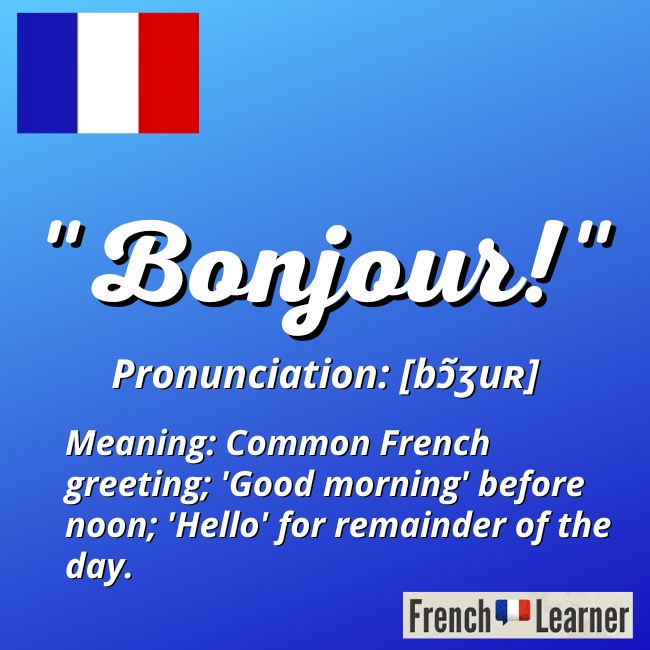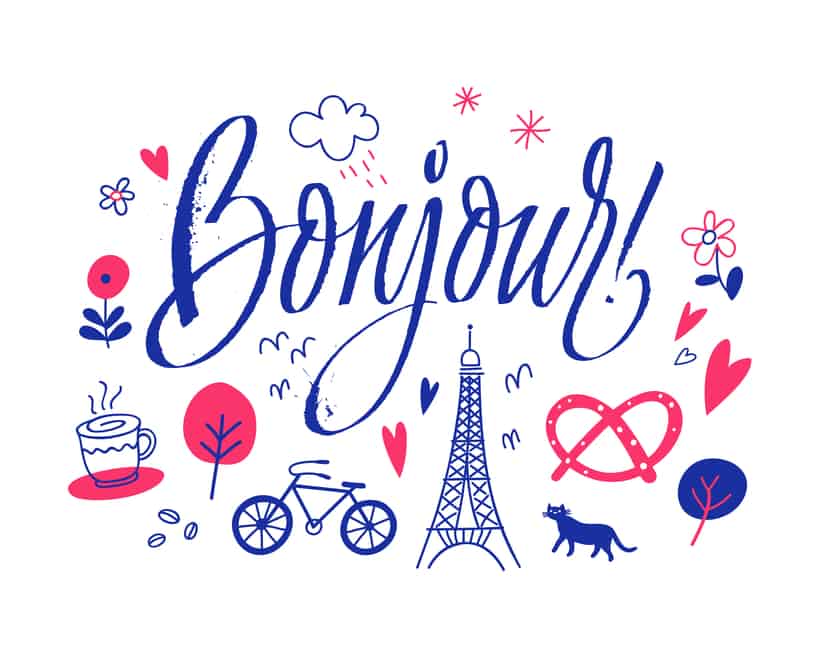What's the first word you learn when venturing into the world of French? It's almost certainly "Bonjour," a word that carries far more weight than its simple translation, "hello," suggests.
This seemingly straightforward greeting is, in essence, the cornerstone of French communication, a linguistic keystone that unlocks a deeper understanding of the culture itself. Its significance extends far beyond mere pleasantries; "Bonjour" is a declaration of respect, a nod to the customs that shape daily interactions in France. Whether you're meeting family, friends, colleagues, or even strangers, the utterance of "Bonjour" acts as a bridge, instantly establishing a connection and setting the tone for the exchange that follows. Beyond its core meaning, the word subtly conveys nuances of politeness and formality, hinting at the speaker's understanding of French social etiquette.
| Category | Details |
|---|---|
| Word | Bonjour |
| Pronunciation | /bu/ (phonetic) |
| Part of Speech | Noun/Interjection |
| Literal Translation | "Good day" |
| Common Translations | Hello, Good morning, Good afternoon (depending on time of day) |
| Usage | Greeting someone, at any time of the day until the evening. |
| Cultural Significance | Sign of respect and a cultural norm in France. |
| Formal vs. Informal | Can be used in both formal and informal settings. |
| Origin | Comes from "bon" (good) + "jour" (day). |
| Examples | "Bonjour, Madame." (Hello, Ma'am.) "Bonjour, comment allez-vous ?" (Hello, how are you?) |
| Replies | Reciprocate with "Bonjour." Other options include "Salut" (Hi, informal) or a response indicating your well-being. |
| Related Words | Bonsoir (Good evening), Rebonjour (Hello again), Au revoir (Goodbye), Salut (Hi, informal). |
| Pronunciation Tip | The "r" at the end of "bonjour" is often lightly rolled or not pronounced strongly. |
| Importance | Essential for showing respect and integrating into French social customs. |
| Cultural Notes | Often used even in situations where "hello" might be skipped in other cultures (e.g., entering a shop). |
| Pronunciation Aid | WordReference.com provides pronunciation and usage examples. |
Consider the nuances: "Bonjour" isn't just about saying hello; it's about acknowledging the other person's presence and showing that you're engaging with them in a respectful manner. While the English equivalent, "hello," might be seen as a perfunctory phrase in some settings, "Bonjour" in France carries a weight of cultural expectation. Its usage is nearly universal, applicable whether you're meeting family, friends, or even complete strangers. Skipping "Bonjour" might be perceived as a social faux pas, a sign of not understanding or respecting French etiquette.
- 4k Khatrimaza Your Ultimate Guide To Ultra Hd Movie Streaming
- Hdhub4u 18 Unveiling The World Of Premium Content
The word "Bonjour" is not merely a greeting; it's a declaration of respect. It's the first step towards building rapport and navigating the social landscape of France. This initial exchange sets the stage for everything that follows, shaping the dynamics of the interaction and influencing how you are perceived. In France, its use isn't optional; it's a fundamental aspect of daily interaction. It is about much more than simply exchanging pleasantries; it is an indication of understanding and adhering to the unwritten rules of French society.
In the US, it's not unusual to bypass a friendly "hello" and get straight to the point. However, the French approach is fundamentally different. The use of "Bonjour" is a sign of respect, deeply ingrained in the culture. It sets the tone for all interactions, from the most casual encounters to formal business dealings. This simple word can open doors and create a more welcoming atmosphere, reflecting a commitment to French customs.
The origin of the word lies in the combination of "bon" (good) and "jour" (day). It literally translates to "good day," giving a more comprehensive understanding of the word's meaning. The term "Bonjour" existed by at least 1230, in written form. It's interesting to note that the "Bonjour" has deep cultural significance and respect. Whether it's morning, afternoon or evening, the French will use "Bonjour" in almost any situation.
- Tonya Westphalen The Inspiring Journey Of A Trailblazer In The Modern Era
- Filmyflywin Your Ultimate Movie Hub
Moreover, the response you give to "Bonjour" is just as important as saying it. The most common reply is to simply reciprocate with "Bonjour." However, the appropriate response varies based on context. In a formal setting, maintaining a respectful and courteous tone is crucial. In contrast, a more relaxed setting, such as with friends and family, might call for something more casual, such as "Salut" (Hi).
Beyond its basic function as a greeting, "Bonjour" opens up an array of other phrases. For example, "Bonne journe" (Have a good day) or "Bonne aprs-midi" (Have a good afternoon) are natural extensions of the initial greeting, showing further politeness. Understanding these related phrases is key to engaging in more complex and meaningful conversations.
So, how do you pronounce "Bonjour"? Phonetically, it's rendered as /bu/. Pay attention to the nasal "on" sound in "bon," and remember the slight rolling of the "r" at the end. Practicing the pronunciation will not only improve your ability to communicate but also make it easier to understand and integrate into the French-speaking world.
The significance of "Bonjour" extends to its use in formal settings, where it helps to create a professional and respectful atmosphere. Its used in almost every scenario, regardless of who youre talking to, be it family, friends, colleagues, or even strangers. This highlights the central place of "Bonjour" in the language, demonstrating its importance in establishing connections and setting social expectations.
The practice of the greeting is a cultural norm that's far from optional if you're interested in understanding French manners. It's a demonstration that you comprehend and appreciate the nuances of French culture. In France, the use of "Bonjour" is a basic rule of politeness, deeply ingrained in social interaction.
In summary, "Bonjour" isn't just a word; it's a key to unlocking the essence of French culture. It serves as a greeting, a declaration of respect, and an insight into the country's social norms. Mastering its pronunciation, understanding its context, and knowing how to respond appropriately are crucial for anyone hoping to engage effectively within the French-speaking world. As you journey into the language, remember: a simple "Bonjour" is often the best starting point.
- Xxmx The Ultimate Guide To Understanding Its Popularity And Influence
- Ullu Web Series 2024 The Hottest Show Everyonersquos Talking About


